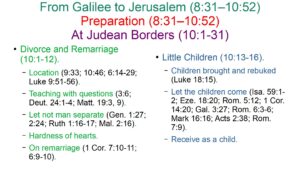Jesus from Galilee to Jerusalem
Mark 8:31–10:52
Preparation
First Prediction of Death and Resurrection (8:31).
The Kingdom is Near (1:15; 9:1)
Final Events in Galilee (8:31–9:50).
Second Prediction of Death and Resurrection (9:31)
Kingdom Has Small Beginnings (4:3-32; 10:29-31)
Divorce and Remarriage (10:1-12).
Location.
Recall, they began in Capernaum (9:33).
They will end up in Jericho when Jesus heals blind Bartimaeus (10:46).
Now it says they traveled to the other side of the Jordan in the region of Judea.
In those days, Judea did not extend across the Jordan, but when Mark was written, it did.
In Jesus’ time, this was the region of Perea, still under the tetrarchy of Herod Antipas—remember him?
 Herod Antipas was the tetrarch of Galilee and Perea, the one who killed John the Baptist at the behest of his illegitimate wife, Herodias (Mark 6:14-29).
Herod Antipas was the tetrarch of Galilee and Perea, the one who killed John the Baptist at the behest of his illegitimate wife, Herodias (Mark 6:14-29).Recall, that John had preached against the marriage of Herod and Herodias and was imprisoned and eventually killed for it. This will be important later.
You’ll note on the map a small detour into Samaria. Upon looking for a possible path Jesus took from Capernaum to this location in 10:1, I found a map that included information from each of the gospel accounts. They stopped by Samaria, but were unwelcome (Luke 9:51-56).
They likely followed the Jordan River after that, on the east side, until they reached the area opposite Jericho—likely not far from where Joshua crossed the Jordan River before his conquest of Canaan.
The people gathered, and He taught them. This was His custom. Give a politician or a preacher a chance to address a crowd, and he’ll take it!
The Pharisees ask him a question. It was not an honest question. They were merely testing Him, perhaps even trying to trap Him.
The question is on divorce: “Is it lawful for a man to divorce his wife?”
Recall how Herod had divorced his Arabian wife to marry Herodias who had also divorced her husband Philip.
Recall also how the Pharisees and the Herodians were plotting to kill Jesus (3:6).
Perhaps one of their plans was for the Herodians to take Jesus’ answer, believing it would be similar to John’s, and report it to Herod. Then they hoped the tetrarch would do to Jesus what he had done to John.
This won’t be the last time they try to do this.
There were two main schools of thought at the time recorded in the Mishna by two prominent rabbis: Shammai and Hillel.
 Both were based on various interpretations of Deut. 24:1 on the legitimate purpose of a divorce.
Both were based on various interpretations of Deut. 24:1 on the legitimate purpose of a divorce.School of Shammai: “A man may not divorce his wife unless he has found unchastity in her, for it is written, ‘Because he hath found in her indecency in anything.’”
School of Hillel: “He may divorce her even if she spoiled a dish for him, for it is written, ‘Because he hath found in her indecency in anything.’” [YLT]
So, the dispute between the two schools is where the emphasis was placed in the admittedly vague Deut. 24:1 passage.
Jesus responds very well, answering their question with a question, directing their attention to the proper Source, the Scriptures.
The Pharisees answer exactly what the Law of Moses stated, but here in Mark, the legitimate reason for the divorce is not discussed—for that you need go to Matthew 19 where the Pharisees ask, “Is it lawful for a man to divorce his wife for any reason?” (answer in Matt. 19:9; 5:32).
Matthew records the lawful reason: fornication. We can get into a huge debate as to what that means here, but for us it typically is manifested in the sexual act of adultery.
Let not man separate—the answer.
Jesus bypasses the passage in Deuteronomy (we’ll talk about why later) and goes to an earlier account, the very beginning, to the very first marriage.
First, He cites the fact that God made them male and female (Gen. 1:27).
Then He quotes from Moses again in Genesis 2:24.
Moses comments on God’s desire for marriage based on this Creation account.
Becoming one flesh is likely a reference to the sexual component to marriage.
But it is even more than that. You are taking two separate people with two separate directions in life and forming an inextricable link between them so that they now walk the same path.
I’m reminded of the oft-quoted passage in Ruth 1:16-17. While that isn’t in the context of marriage, this does reflect the mindset of those entering into a marriage. Their two paths merge, two families merge, till death do they part.
And when you add children into the mix, there forms an even greater link.
This is why sexual relations outside of marriage, children out of wedlock, and divorce are so harmful to the family and especially to the children.
Extra-marital sex distorts your relationships, illegitimate children miss out on having both parents in the home, and divorce does the same thing.
In every legitimate marriage, both parties make their vows before God and men. God is present and participates in the event whether you realize it or not, whether you believe in Him or not. While it may be a decision that both parties make, it is God who ultimately joins them together.
Man has no right to separate what God has joined together. But does he try? Oh yes, and the current divorce rate is evidence of this.
As Malachi records, “For the Lord God of Israel says that He hates divorce, for it covers one’s garments with violence” (Mal. 2:16).
The hardness of your hearts.
But then, if the Lord hates divorce, why the vague provision in Deut. 24:1?
Recall, it was “because of the hardness of your hearts [Moses] wrote [them] this precept” in Deut. 24.
But why? As one commentator put it, “The order from Moses was not so much permission as it was regulation to curtail wholesale abuse of women by men who potentially could put them away and them take them back at their own convenience. [Recall that in Deut. 24:1-4, Moses forbids them from remarrying one whom they put away.] The law of Moses of itself regulated social life, but when that law was violated, judicial precedent was necessary to protect those who were being used or abused” (Stauffer 224).
So, it was to regulate something to help prevent the abuse of women. You see, the Lord through the OT raised the moral awareness of the people of that time. The Lord through the NT raised it even further.
Even so, this concept here opens a huge can of worms. By what principles then, do we determine if a command, passage, or ruling should be ignored “because of the hardness of hearts”?
We have seen in several places in Scripture, even talked about them in this class on Mark, where there are situations where the commands of God conflict.
There needs to be a way in which we can determine which laws take priority.
First, the NT always takes priority over the OT since the NT is the Law that is in effect now.
Also, keep in mind the two greatest commands: love God, love your neighbor.
Does divorce show love for God? Since you made a vow to God, it does not.
Does divorce show love for your neighbor (i.e. your spouse)? No, since it “covers one’s garments with violence” (Mal. 2:16).
What if you reason in your mind that it’s more loving to your spouse to divorce him/her? Let’s not forget your vow to God. In other words, make it work.
If you have given it your due diligence and you still cannot make it work, then we have what Jesus tells His disciples later.
On remarriage.
We see in Matthew that the disciples had a hard time with this saying, so they question Him further. Here it says the did so in “the house” – probably wherever they happened to be staying that night.
We note here that Jesus does not say that divorce is absolutely, 100% wrong.
As we read earlier, however, it is certainly undesirable.
What is wrong is remarrying after a divorce—Jesus calls it adultery.
It is clear, then, that even if you have a legal divorce and can legally remarry, that does not mean you are eligible to remarry in God’s eyes.
Of course, let us keep in mind the exception in Matt. 19:9—if the divorce was for fornication, then one may be eligible to remarry. There are so many scenarios we could go over to talk about it, but I do think one or both parties are eligible depending on the nature of the fornication.
Before you think I’m a heretic, one scenario where both would be eligible to remarry would be a marriage between two eligible people that wasn’t legitimate in the first place, such as a same sex marriage. Should they come to Christ, they would realize their marriage is wrong and divorce each other. They could both remarry someone of the opposite sex if they wanted to.
Only one is eligible if the fornication is having an extra-marital affair. The one who committed the fornication must not be rewarded with another chance to marry.
Even if adultery occurs, staying together is preferable (Mal. 2:16), but the Lord does not bind that on you (Matt. 19:9).
But what if the divorce is not for fornication? Thankfully, the Apostle Paul provides an inspired commentary on this issue (1 Cor. 7:10-11).
He says do not divorce. If your spouse leaves you, remain unmarried or be reconciled.
Remain unmarried, that is, do not remarry!
Is that easy? No, but committing adultery is not worth it. After all, adulterers will not inherit the kingdom of God (1 Cor. 6:9-10).
One more point. We see that Jesus comments on a woman divorcing her husband. Some criticize this point, saying that women could not divorce their husbands in Judaism.
It’s true, there is no provision for that in the OT, however it could be done in Roman society.
At the same time, did not Herodias divorce her husband Philip? It also occurred among Jews, even though it was not legal according to the OT.
In order to be right with God, Herod and Herodias had to dissolve their adulterous and illegitimate marriage. If we are in such a marriage, we, too, would have to do the same.
Is that easy? No, but continuing to commit adultery is not worth it. Impenitent adulterers will not inherit the kingdom of God.



